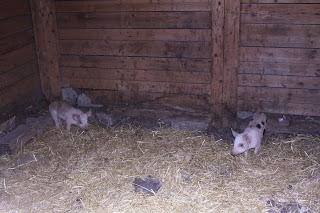We loaded up a 24-foot Uhaul truck and,
with it filled to the brim, bolted to the 401 in hopes that we
would beat rush hour. We got caught up in accident traffic just the
same and that had us lumbering along for the first hour of the drive
before the frenzied pace began, the truck swaying in the current of
passing semis, until soon we reached the more leisurely stretch toward Frontenac. We got in around sunset, unloaded what we could until
sometime around midnight, at which point we called it a day.
We woke up the next morning rural folk. The sunrises are generally beautiful here. But we
did not take a leisurely breakfast on the porch that first morning. We got back to
unpacking. And hammering nails, and calling farmers and feed dealers
and custom ploughers.
After
a long second day of unloading countless boxes, the burden of a
hectic urban routine fading, the stillness struck me and a fear set in. It was mostly neuroses,
but it went deep. The question “What on earth am I doing?” which
I'd asked myself in a flippant tone many times before the move,
suddenly weighed a ton. Bell (the phone company) revealed, after
bouncing us from department to department and giving contradictory
information, that, though they had confirmed weeks before that they
would be installing our internet connection at the new residence,
it turned out they didn't actually offer service where we were now.
I read Thomas Pollack's War in the
Country recently, which reveals much about the divisions between
rural and urban Canada and the fact that the “country” is
increasingly forgotten because it is seen as dying and irrelevant.
This news furthered the revelation that only cities matter (I should
point out that since then I have been recommended a few providers
that are quite competitive and widely used where I am. It's not
really out of range of the internet.)
But the fear of having grossly
miscalculated on my life change still creeps in every day. For a little while that evening, I felt a dread at the image of myself 10
years from now – a sloppy yokel with junk piling up in the yard.
Despite the general anxiety of
living in a new place (which, in my experience, tends to be full of exaggeration and worst-case scenario creation) we are in a community that seems to value community. While we are in a politically conservative rural riding,
where anti-government and anti-urban sentiment are not uncommon, and
a smattering of xenophobia and homophobia exists, people here are
mostly friendly, approachable and laid-back. There is a spirit of
the back-to-the-lander movement, though nobody likes that term except
me.
It's a place where, if you go up and
knock on a stranger's door because someone told you she would be a
good resource for learning about raising sheep, you will be greeted
with only mild caution and then within seconds a warm conversation
will have begun and before you know it, she will have given an hour
of her time to explain her methods and happily put you in touch with
several friends who can help further. And then the friends
recommend more contacts. And suddenly you have learned a great deal
about sheep and you sense that soon enough you will have landed a
small herd because someone will connect you to a breeder who has none
at the moment but who knows someone who does and will be happy to
connect you.
I am encouraged to see signs of community. In the evenings, of course, I am reminded of the fact that
I'm far from the distractions of the city. I'm far from grocery stores, coffee shops, pubs, neon. The traffic zips
by on the highway a few hundred metres away in one long strand and
otherwise, it is
quiet.











